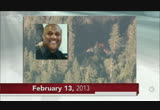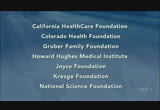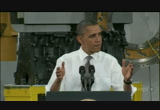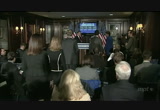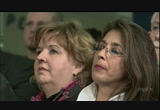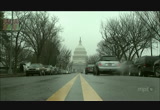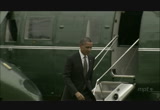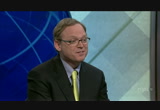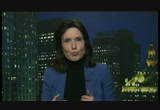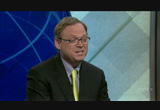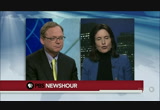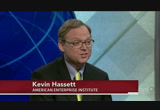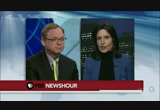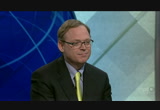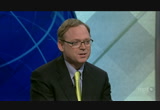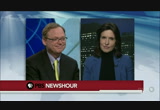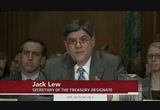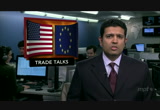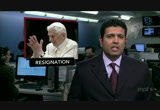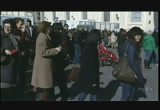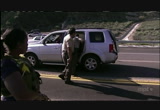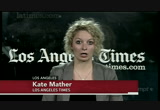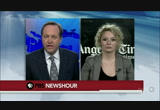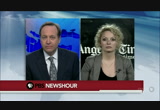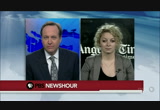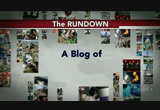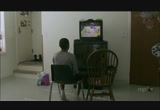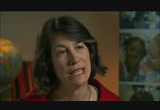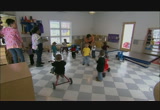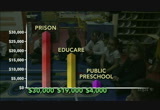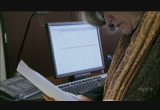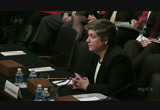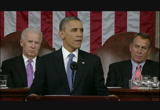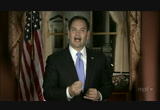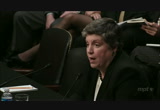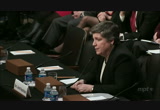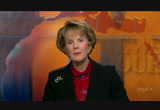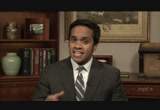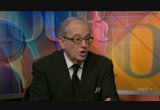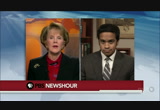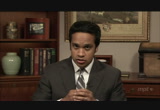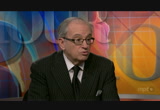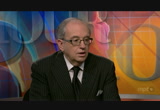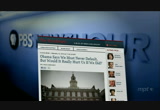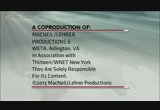tv PBS News Hour PBS February 13, 2013 6:00pm-7:00pm EST
6:00 pm
captioning sponsored by macneil/lehrer productions >> woodruff: president obama pushed for a hike in the minimum wage as he toured a north carolina factory, one part of the second term agenda he laid out last night in his state of the union address. good evening, i'm judy woodruff. >> brown: and i'm jeffrey brown. on the "newshour" tonight, we assess the merits of the president's plan to increase prosperity for working class americans. >> woodruff: then, we get the latest on the fiery end to the manhunt for a former los angeles police officer and the investigation into homicides he's accused of committing. >> brown: we take a second look at a story about programs in chicago targeting high-risk, low-income students long before they get to kindergarten.
6:01 pm
>> i don't think we understood how much of a barrier deep, deep poverty is in terms of engaging families and creating opportunities for children. >> woodruff: and margaret warner examines the calls for action on immigration reform, coming from both sides of capitol hill. >> woodruff: that's all ahead on tonight's "newshour." >> major funding for the pbs newshour has been provided by: >> and with the ongoing support of these institutions and foundations. and... >> this program was made possible by the corporation for public broadcasting. and by contributions to your pbs station from viewers like you. thank you.
6:02 pm
>> woodruff: fresh from addressing the nation, president obama opened a new campaign today to sell his second-term economic plan. in turn, republicans dismissed most of his ideas as the failed policies of the past. the president flew south today, going directly to voters with his ideas for creating jobs and boosting the middle class. the post state of the union tour began in asheville, north carolina, at a plant that makes heavy-duty engines. he picked up where he had left off with his message the night before. >> our job as americans is to restore that basic bargain that says if you work hard, if you're willing to meet your responsibilities, you can get ahead.
6:03 pm
( applause ) you can get ahead. doesn't matter what you look like, doesn't matter where you come from. our middle class, when it's growing, when it's thriving, when there are ladders of opportunity for people to do a little bit better each year and make sure that their kids are doing even better than them, that's the american dream. that's what we gotta fight for. that has to be the north star that guides everything we do. >> woodruff: the president served notice last night he plans to fight for raising the federal minimum wage from $7.25 to $9 an hour over the next three years. >> even with the tax relief we've put in place, a family with two kids that earns the minimum wage still lives below the poverty line. that's wrong. >> woodruff: but republicans-- led by house speaker john boehner today-- renewed long- standing arguments that a hike will actually hurt job creation. >> listen, i've been dealing
6:04 pm
with the minimum wage issue for the last 28 years that i've been in elective office. and when you raise the price of employment, guess what happens? you get less of it. at a time when the american people are still asking the question, where are the jobs? why would we want to make it harder for small employers to hire people? >> woodruff: the president's economic to-do list also called for: improved access to high- quality, early childhood education; partnerships with the private sector and colleges to help american manufacturing and expanded job training programs for unemployed workers. today, he expanded on that theme, announcing a goal of training two million americans with skills that lead directly to new jobs. >> no job in america should go unfilled because somebody doesn't have the right skills to get that job. ( applause ) nobody.
6:05 pm
so, if there's a job open, we should train those folks right away so that they can do the job. >> woodruff: the battle over the budget and its potential effects on the economy were also very much at the heart of the state of the union message. the president urged lawmakers to prevent $85 billion in automatic, across-the-board spending cuts set for march first. and he insisted again that it be done by balancing cuts with tax increases. >> now, most of us agree that a plan to reduce the deficit must be part of our agenda. but let's be clear: deficit reduction alone is not an economic plan. ( applause ) >> woodruff: this morning, republicans insisted they are giving no ground on that issue. senate minority leader mitch mcconnell said mr. obama missed an opportunity in his remarks on the looming spending cuts, known as the sequester.
6:06 pm
>> the president had the chance last night to offer a thoughtful alternative to his sequester, one that could reduce spending in a smarter way. that's what republicans have been calling for all along, and it's the kind of thing the house has already voted to do twice. we want to work with him to make that happen. but, instead, we just got gimmicks and tax hikes. just one more plan from the president that's designed to fail, so he can blame others when it does. >> woodruff: it's unclear how much of the president's plan can get through congress, but the white house says he will keep up the pressure, with stops in atlanta and chicago in the coming days. for a closer look at some of the president's prescriptions and how they fit into the larger questions about inequality in america, we get two views. kevin hassett is director of
6:07 pm
economic policy studies at the american enterprise institute, a conservative policy research center and katrina vanden heuvel is editor and publisher of "the nation", a liberal weekly magazine focusing on politics and culture. welcome to you both. so the president spent a lot of time last night, kevin hassett, talking about the importance of growing the middle-class, but he also said we must make sure that hard work leads to a decent living. in fact, he said today in asheville, if you're working full time you shouldn't be in poverty. is that a premise that's widely accepted, do you think? >> i think we all would wish that would be true. the problem is when there's periods of high unemployment the wage isn't low enough to encourage employers to give people a job. right now there are about five million people that have been unemployed for more than 27 weeks and the unemployment rate for, say, african american youth, is about 38%. so we've got massive
6:08 pm
unemployment. it's a big problem. and i agree with speaker baner that increasing the cost of hiring a person right now is not the way to solve that problem. >> woodruff: katrina vanden huevel, what about this essential point that we shouldn't be in a situation, wrefb w the economy where it is, where if you work full time you can still be in poverty. >> i think that we haven't seen an increase with the minimum wage judy since 2007. though 19 states across this country have increased theirs. it seems both moral and practical that in the richest in nation in the world that someone working full time should not live in poverty. and studies over the last 20 years in states where we've seen these minimum wage increases showed there's no discernible impact on employment growth. in fact, what it does is line low-wage workers' pockets with higher wages. it's a natural thing to increase wages so that demand increases. that leads to recovery. because at the end of the day,
6:09 pm
what the president is talking about is building a strong middle-class. and the real job creators in this country are the middle-class. >> woodruff: kevin hassett, what about her point? that there are all these stud cheese have been done over time that show -- you're already shaking your head no. that show that if you increase the minimum wage people will take more money home. >> there are -- it's absolutely true that the people who don't lose their jobs will take more money home. but there's a recent review paper by federal reserve economist bill washer and his colleague david newmark that finds when you look at all of the papers that have been written that the balance of the evidence is that unemployment goes up by not a huge amount but by some if you lift the minimum wage. it makes sense if you lift the cost of something you get less of it. if you apply the average effect that they have in their paper to the president's proposal, it would lift, for example, the teen unemployment rate amongst african americans from 38% to about 43%. i think that that kind of a change is not what we should do. but i agree with katrina that we
6:10 pm
should be very, very concerned about welfare of people at the bottom. the problem is that lifting the minimum wage is kind of a way too make it look like you're helping them when you're not and it's a way to do it without spending taxpayer dollars. i think if you want to give more money to low income people you should 'fess up and spend the money as a government. but to try to say that we're going to require employers to give them more money it's not going to work because it's basic economics. >> i think there are a whole wealth of things we could be doing, including the earned income tax credit. but we need to step back for a moment. we were witnessing the greatest concentration of wealth in this country that we've seen in a century, the redistribution of wealth upwards is making this a country where upward mobility is no longer in our sights. where the investment in our future is being diminished. i think last night the president spoke to a future that millions of americans want to see. there is broad support by the way for minimum wage increases and we are seeing a working
6:11 pm
class a middle-class, viewed di, which over the last three decades has seen their wages and income stagnate while the very rich have seen their tax burden lighten in ways not seen in three or four decades. it's a face of a country that we need to look at and understand that inequality is perhaps the greatest threat to our economic recovery and democracy and in that context we must take action. >> woodruff: given what she's pointing out, even if studies show it isn't a perfect solution, why not try raising the minimum wage? >> . >> oh, because there are better ways to do it. so if you want to target low-income workers and try to improve their lives a better try do it would be to provide a subsidy to employers who hire low wage workers. that would increase the demand for those workers, which would drive up their wages. and it wouldn't make anyone lose their job. >> reporter: that money would come from the government, is what you're saying. >> that's the point. so what people are doing is trying to help without spending
6:12 pm
taxpayer dollars and it's not going to work. it's not going to help. it's going to hurt fewer people than you help but those people are going to be hurt very, very badly. losing your job is a terrible thing to have to suffer. >> it's a terriblable thing. and the president last night laid out-- perhaps not at the scale needed for the joblessness that is the real crisis in this country-- programs like a 21st century work projects administration to repair the deteriorating infrastructure. but so often the republicans are so antigovernment they're not willing to consider what kevin just spoke of, subsidies to employers. we need to think anew. part of that, if i might add, is that we need to tax wealth more not work. we need to think harder about how it is that the concentration of wealth has become so high and we can find ways, whether it's a financial transaction tax, making sure dividend and capital gains tax are taxed at income tax rates, the carried interest tax rate the president spoke of
6:13 pm
the other day must be repealed. why should hedge funders and private equity managers be getting a loophole, a kind of benefit, that millions of ordinary working americans don't get? >> woodruff: those are some of the things the president has talked about. what about doing that? >> well, no, i mean, the fact is that there's nothing on earth more mobile than capital and capital income. and the u.s. is a relatively high capital income tax country. we have about the highest corporate tax on earth. i think guiana and the congo have higher rates. other than that, nobody does. so if we try to drive up the amount of revenue we extract from capital the capital flees and there are no jobs in the u.s. so we have to have a more 21st century appreciation for how economies really work. and if we want to create high-paying jobs for people we need to create an environment that's friendly to firms to create jobs. >> the tax burden -- i was going to say, the tax burden on corporation is the lowest it's been in decades. >> because they're locating the jobs overseas. that's how the curve works.
6:14 pm
>> 11 european union commissioners, including the conservative finance minister of germany has signed on to the financial transaction tax. i think you're seeing an understanding of a 21st century economy and how it treats capital. not in this country, not from the republicans. but if i could just say one important thing. last night, the investment, the call for the investment in universal pre-k early education. this is an investment -- >> woodruff: yeah, i wanted to ask you both quickly to respond to that. >> any advanced country understands this is a public investment in our children, our future, and if we want to see upward mobility restored in a country that prides itself, has prided itself on that, this is one step. >> and i think this is one place where, refreshingly, we might see some bipartisan action because i think most republicans i talk to absolutely agree that getting school to kids earlier is a really good idea. i think there's evidence that things like head start in the past have been very effective.
6:15 pm
the one disagreement i have with the president's proposal is i think that making it universal is a big mistake. that most kids have access to preschool that's really, really great. i know wealthy kids, for example, do. and what we need to do is target preschool in the places that most need it because we have scarce tax dollars. >> woodruff: so who would be left out? >> well, what you would do is provide universal preschool to people that can't afford it but to people who can afford it then we don't need to give a lot of tax dollars to them for something they're already buying. >> there are a lot of people in this country, kevin, who can't afford it. >> right, and they're the ones who need the help. if it's universal, you're giving hope the my kids who would get pre-k anyway because i'm fortunate enough to be able to afford it. >> woodruff: we hear you both. the debate has only begun. katrina vanden huevel, kevin hassett, thank you both. >> brown: online, find reaction to the state of the union from members of congress, foreign policy experts, and a panel of voters, journalists and scholars who talked to christina
6:16 pm
bellantoni in a google hangout last night. and still to come on the "newshour": the dramatic end to the massive manhunt in california; preschool programs to close the achievement gap in chicago and a call for action on immigration. but first, the other news of the day. here's hari sreenivasan. >> sreenivasan: the president's nominee to be secretary of the treasury jack lew fended off criticism today of his time at citigroup. he was ceo from january of 2008 until early 2009, when he joined the obama administration. during his tenure, he invested in a citi fund that was registered in the cayman islands, well known as an offshore tax haven. republicans pressed lew on the issue at his senate confirmation hearing today. >> my benefit was really very small in the sense that i took a loss when i sold the investment. i always reported all income. i always paid any taxes that were due. i very strongly believe that we should have tax policies that make it difficult, if not
6:17 pm
impossible, to shelter income from taxation. >> sreenivasan: lew is expected to win confirmation in the full senate. that vote could come late this month. the obama administration is now calling for congress to close gaps in the nation's cyber- security. the president signed an executive order on tuesday, increasing government efforts to share information on threats. it also urges voluntary efforts by industry. congress has struggled to reach consensus on the issue due to legal and privacy questions. this was a mixed day on wall street, as stocks searched for direction. the dow jones industrial average lost more than 35 points to close below 13,983. the nasdaq rose ten points to close near 3,197. the u.s. and the european union have agreed to begin talks on a trans-atlantic free trade zone. the announcement today said an agreement would add thousands of jobs on both sides of the atlantic. in brussels, the president of the european commission jose manuel barroso voiced optimism. >> a future deal between the world's two most important economic powers will be a game- changer.
6:18 pm
together, we will form the largest free trade zone in the world. so this negotiation will set the standard, not only for our future bilateral trade and investment, including regulatory issues, but also for the development of global trade rules. >> sreenivasan: talks will begin in june. officials said the goal is to finalize an agreement within two years. in afghanistan, a nato air strike triggered new outrage today, after reports that it killed ten civilians, along with four insurgents. it happened overnight during an operation in kunar province, near the pakistani border. afghan leaders said the civilians were in a house next door to where taliban leaders were gathering. president hamid karzai condemned the air strike. the international coalition said only that it's investigating. pope benedict the sixteenth was greeted with cheers today, at his final public mass before stepping down. the 85-year-old pontiff celebrated ash wednesday services at st. peter's basilica at the vatican, marking the start of lent. we have a report from james mates of "independent television news."
6:19 pm
>> reporter: it was not quite a rock star's welcome, but was not far short of it as thousands of pilgrims crowded into the audience hall at the vatican for pope benedict's first public appearance since announcing his resignation. as he tried to speak, he was drowned out by applause, finally managing to thank them and the wider catholic world for their sympathy and understanding. >> (translated): i have decide renounce the gift the lord gave me. i decided to do this after praying far long time and examining my conscience in front of god. >> reporter: all way dorr shippers have been queues for events in the vatican, culminating with this evening's mass in st. peter's basilica. ash wednesday-- the first day of lent-- is anyway one of the
6:20 pm
catholic church's holiest days. but events of the last 48 hours have given this evening particular significance. before lent is out, the vatican tell us we will have a new pope. no longer able to process the length of st. peter's, pope benedict is wheeled through the basilica at the head of the college of cardinals from whose number is successor will be chosen. he spoke today of no longer having the physical and spiritual force his ministry requires. >> sreenivasan: the pope will officially resign on february 28. those are some of the day's major stories. >> brown: the manhunt that kept southern california on edge for more than a week appeared to be over today. still, the investigation continued in the big bear lake area after the apparent demise of a former policeman-turned- killer. it came down to this cabin in the woods, burning furiously as daylight waned tuesday, near big bear lake. police said christopher dorner went in, but never came out. today, investigators said charred human remains were found inside, along with a driver's license in dorner's name.
6:21 pm
the fugitive former los angeles police officer was suspected of killing four people over the course of nine days. he had vowed revenge for being fired from the force. dorner disappeared in the big bear area on friday, then suddenly reappeared yesterday. he stole two cars and got into a running gun fight with game wardens. >> he rolled down his window and he opened fire on the two officers who were in the second fish and game patrol car right behind him. ultimately that patrol officer stopped, pulled out his rifle and engaged probably 15 to 20 shots as dorner was driving away. >> brown: the entire big bear area was cordoned off. schools were in lockdown mode, and san bernardino police set up checkpoints and searched cars for dorner or anyone who might be assisting him. >> we was really scared. every, as soon as that happens i wake up every day like three or four or six times a night looking at the windows, looking at my gun, making sure i have
6:22 pm
bullets, you know. be prepared. >> brown: dorner ultimately took refuge in the vacant cabin, where he got into another intense firefight with san bernardino sheriff's deputies. one was killed, and another wounded. a short time later, the fire broke out, after a swat team assaulted the building. a single shot was heard, and then, nothing. today, as tensions across the region eased, one of dorner's earlier victims was laid to rest. riverside police officer michael crain's hearse was followed by a long procession of his law enforcement colleagues. joining us now is kate mather, who's been covering this story for the "los angeles times." kate, first, what's the latest with a final i.d. of the body? >> right. that's something that investigators were beginning to work on today. they said it could be some time before we know for sure if the body found in that cabin is indeed that of christopher dorner's. they have to make the positive
6:23 pm
identification. and while authorities indicated that they would try to expedite that process, we still have not received official word from authorities today that that was, in fact, dorner's body. >> brown: one of the questions still out there, of course, is what or who started the fire. how much is known? >> what we do know right now-- again, that's something thing that authorities haven't said one way or the other. but we do know that during the middle of this intense gun battle between authorities and the man they believe that was dorner up at that cabin, sources have described that situation to us as something that was very, very intense. they said that there were hundreds of rounds fired, that there seemed to be no letting up in terms of the gunfire coming from the cabin. so they began to evaluate their options and authorities realize they wanted to resolve this situation, dark was coming. there, again, didn't seem to be an end from the gunfire. so one of the decisions they made was to put tear gas in.
6:24 pm
and one of the things that sources have told my colleagues is that they initially used a lower grade tear gas and when that didn't work they used a higher more potent tear gas that's commonly referred to as incendiary tear gas and that burns hotter than your typical tear gas would and one of the risks associated with using that type of tear gas is because it burns hotter it can spark fires. and so that tear gas was kwraouded in clearing the cabin. again, authorities told my colleagues and i that they believed that that would drive dorner out. they said he was refusing efforts by negotiators and that was the move they made. >> brown: he ended up in an area close to where he started and it had been thought he had left that area. is there still confusion or many questions about thesy kwepbs of events over the last few days?
6:25 pm
>> you're exactly right. his truck was found on thursday and there were hundreds of officers out there at once point searching cabin to cabin, looking at tracks that led away from the truck and so -- but we didn't see any new signs of dorner until tuesday morning when these women went up to this condo that they were going to clean and saw a man that they thought was him inside. so it remains to be seen if he was there from thursday to tuesday morning. residents up there are, of course, speculating one way or the other. some people said they thought he was long gone. others said they had a hunch the whole time he was there. we're hoping authorities clear up that -- some more of that for us in the coming days. >> brown: and i'm wondering, these were such incredibly tense days there, especially in that area. what's the atmosphere today? >> there's a big sense of relief is what we're hearing. a lot of people who again said they were on edge and tense the last couple days, some people told us they had been keeping
6:26 pm
their guns handy. today they said they're much more relaxed now even though, again, there's been no official word that that body is dorner's people seem to think that it is. there's a lot of people saying that they're relieved, they're glad it's over, that they don't have to worry anymore. but there's also a sense that it's a bittersweet moment for many people up there. when one of my colleagues spoke to the big bear mayor, he pointed out that although there is the sense of relief for the community, they also have very saddened by the fact that one sheriff's deputy was killed and another wounded while trying to protect the people up there. so they are very aware that that is going on and very upset about that that that happened. >> brown: and the police even though they're being cautious and still continuing the investigation but it looks like they've gone back into something more like a normal mode? >> you could definitely -- it's one of those situations here while we don't have official word you can kind of tell by some of the behavior that law enforcement too is a bit more
6:27 pm
relaxed. los angeles police resumed normal operations as of last night is what a lieutenant told us this morning. and the 50 or so protective details that had been issued for some of the people named in the manifesto alleged to be dorner's, those protective details, most of them had been lifted. there were about a dozen that remained but you can definitely tell at least down here in los angeles that there seemed to be -- people seemed to be more relaxed. >> brown: kate mather of the "los angeles times," thanks so much. >> thank you. >> brown: we've linked to more reporting from southern california public radio, including an updated timeline of events. that's on our website. >> woodruff: as we said earlier, president obama called for universal and affordable preschool programs for all
6:28 pm
children. it's an idea that's been brewing for some time. we take a second look at a story the "newshour's" education correspondent john merrow first reported in 2011. it's about educators in chicago working to give lower income students a leg up in their pre- kindergarten years and boost their prospects for life. >> reporter: children raised in homes with educated parents swim in a sea of language, a world of vocabulary-rich conversations >> maya, why don't you show daddy what you want him to do? why don't you demonstrate? >> reporter: the contrast, for low income children could not be more dramatic. by the time children are ready for kindergarten, some will have heard millions more words than others. without intervention, this
6:29 pm
vocabulary gap can lead to a school achievement gap. that in turn can mean college for some, while others drop out without even learning how to read. >> the cost of school failure is enormous. it's prisons, it's unemployment, it's dissatisfaction in neighborhoods and communities. all of that is going to cost you and your kids money. >> reporter: a lot of money. it costs about $30,000 a year to keep someone behind bars. over two thirds of inmates never finish high school. >> are you going to pour me some water? >> reporter: this program in chicago helps children before they have a chance to fall behind. >> are you going to fill my cup up? i need some water. >> we spend about $18,000 to $20,000 per child per year. that seems like a lot of money but when you do the return on investment, we believe it actually pays off. with a per-pupil price tag that
6:30 pm
is two thirds of what it costs to house a prisoner, diana rauners program, educare provides high-quality child care and preschool for at-risk children up to age five. infants are accepted as young as six weeks. >> the most important time for us to intervene is really in the first thousand days of life. a time when the brain is developing so quickly and when interactions with adults matter so much to children's developing sense of who they are and their language development. >> reporter: educare is open 11 hours a day, five days a week, all year round. children get good food, regular exercise. and those with special needs receive additional supports in small groups. >> would you like me to put the sand in your hand, can you say hand?
6:31 pm
>> our teachers all have bachelors degrees and they have infant toddler certification. they've worked very, very hard to learn how to appropriately develop language and social/emotional skills. >> reporter: the program seems to be working. a study that measured literacy skills and emotional development, found that students who attended educare for five years enter kindergarten as prepared as their middle class peers. >> the only way we're going to systemically break that achievement gap, close that achievement gap is by investing in early education. >> reporter: chicago has about 90,000 children under the age of five that need a program like educare. educare has room for just 149 children. >> just like when you go to nap. nap time. >> reporter: think about it.
6:32 pm
that's not even two tenths of 1%. what about the other 99.8% of needy children? what is chicago doing, if anything, to close their vocabulary gap? >> let's see who we are missing today. one, two, three, four, five, six. every child whose parent wants him to be in preschool and cannot afford to send them to a private school ought to have an opportunity to go to a public preschool. >> reporter: that's the goal, but money for preschool is tight. >> what we're trying to do is to find a model that will provide sufficient support for most of the children who need it. >> reporter: chicago's largest preschool program costs about $4,000 per student, significantly less than educare. but it's closed in the summer, is just for three and four year olds and lasts only two and a half hours a day, not 11.
6:33 pm
is two and half hours a day enough for high risk kids? >> for some children, two and a half hours a day is probably enough, particularly if we can offer it two years running. >> reporter: the program is called preschool for all, but that's a misnomer. it reaches only 24,000 kids and at some schools there's a waiting list. even when you add in the children attending head start and other pre-k programs, that's only 37,000, out of the city's 90,000 neediest children, who benefit. and the rest... >> they're here from 6:30 in the morning until about 6:00 at night. they play by themselves the majority of the time. they love watching tv. >> reporter: jacqueline brown spends each day with her grand children while her daughter is out looking for work. >> in this community, there's a lot of kids who don't go to
6:34 pm
school. some parents need their kids to go all day. they don't have an all day here. they just only go part time. in the morning time from 8:00- 10:30. >> reporter: in a large city like chicago, just getting to the program can be a challenge, especially for families with more than one child and no car. >> some people feel that it's a waste of time. they don't want to go pick them up in a hour and a half, so they feel it's not, it's not worth it. i don't think we understood how much of a barrier deep, deep poverty is in terms of engaging families and... and creating opportunities for children. >> reporter: maria whelan's organization helps low income families find child care and educational programs for their children. it's a struggle. >> almost two-thirds of the three- and four-year olds in these very, very poor communities have no access to classroom-based preschool, head start or child care programs.
6:35 pm
the kids who need it the most. the kids who need it the most. >> reporter: does this embarrass you? >> it embarrasses me in the sense that we are unable, not just in illinois but throughout the united states, to mobilize sufficient public opinion to support something that everybody, every piece of research shows would help us just immeasurably improve child outcomes in terms of education. >> reporter: in these hard economic times, chicago has spends about $5,000 per child on 40% of its neediest kids, and virtually nothing on the rest. that choice-- provide more services to fewer children or fewer services to more, is one that maria whelan rejects. >> it's a choice that we absolutely refuse to make. you know, i'll be damned if there are ten sick children and
6:36 pm
amoxicillin exists for only one of them. i... i think the job of those of us who... who... who do this work is to go out and break down every door and every barrier we can to make sure there are ten doses of... of amoxicillin for all of those children. >> reporter: and as difficult as it is today, the future for pre school in chicago looks worse. >> the budget situation right now is dire. many states were using stimulus money to support educational programs. in chicago, we were using it for our preschool program. if we don't have that money next year, we will have to cut the number of children that we serve. >> reporter: illinois is not alone. at least ten states have already cut spending for early education, with more certain to follow. >> woodruff: a postscript to john's report: since this piece aired in april 2011, state spending on pre-school seems to have declined, however, this year many governors are promising to
6:37 pm
increase funding for pre-school programs. and one of the people john interviewed, barbara bowman, stepped down last year as head of the chicago public schools early childhood programs. >> brown: and we return to politics as lawmakers on capitol hill begin to discuss ways to address the estimated 11 million undocumented immigrants living in the united states. margaret warner has our look. >> warner: it was the senate's opening hearing on the new push for immigration reform and the emotions around the issue surfaced early, as protesters briefly interrupted the proceedings. but quickly, the secretary of homeland security former arizona governor janet napolitano, told the judiciary committee that now is the time to act.
6:38 pm
>> i can say without equivocation what everyone who deals with this issue knows well: our immigration system is not just broken; it is hurting our country. the time to fix it is long overdue. and the way to fix it is with commonsense, comprehensive immigration reform. >> warner: the hearing came two weeks after president obama laid out his own goals for immigration reform. they include: stronger border security; a pathway to citizenship for some 11 million illegal immigrants already here and expedited visa s for highly skilled workers from abroad. he returned to the issue in last night's state of the union address. >> our economy is stronger when we harness the talents and ingenuity of striving, hopeful immigrants. ( applause ) and right now, leaders from the business, labor, law enforcement, faith communities-- they all agree that the time has come to pass comprehensive immigration reform.
6:39 pm
( cheers and applause ) now's the time to do it. now's the time to get it done. now's the time to get it done. >> warner: the immigration issue has gained momentum since the election, when the president won 70% of latino votes. and a bipartisan group of eight senators also has unveiled a framework for reform. today, democrats on the judiciary committee, including chairman patrick leahy of vermont, said opponents need to think twice. >> now, despite all our efforts and all our progress, there are some stuck in the past who are repeating the demands of enforcement first. i fear that they mean enforcement only. to them i say this has stalled immigration reform for far too long. >> warner: but republicans insisted again that securing the border must come first. even marco rubio of florida-- a member of the bipartisan group of eight-- said this in the republican response to the president last night. >> we can also help grow our... grow our economy if we have a legal immigration system that allows us to attract and assimilate the world's best and brightest.
6:40 pm
we need a responsible permanent solution to the problem of those who are here illegally. but first, we must follow through on the broken promises of the past to secure our borders and enforce our laws. >> warner: that history was never far away at today's hearing, for many republicans, including texas senator john cornyn. senator chuck grassley of iowa is the committee's ranking republican. >> this is like deja vu for a lot of us. but i believe that the reason immigration reform failed in 2007 is because the american people don't actually believe congress intends to follow through on important measures like border security, worksite enforcement, visa overstays, and the like. >> warner: napolitano told cornyn that the obama administration has done much to stem illegal border crossings. and she argued that providing a legal pathway to citizenship and cracking down on employers who hire undocumented workers will do more. >> we know the main driver of illegal immigration across the texas border, arizona, california, whatever, is the
6:41 pm
ability to work, but we don't have the tools to support the border with effective worker requirements and prosecution tools against employers. so when you think about immigration reform, that's why all these things go together. it is a system. >> warner: south carolina republican lindsey graham-- another member of the group of eight-- said he sees a different obstacle to comprehensive reform. one that was thrown up last time by democrats. >> here's the friction point. temporary workers are needed in the future, a legal source of labor for american employers. do you agree with that? >> yes, that concept is one i can agree with. >> and the goal is not to displace an american worker you can only get a temporary worker when there's no american available at a competitive rate. >> well, the devil is in the details. you've got to have appropriate protections for american workers and indeed for workers who are coming in to work. >> reporter: the committee also heard from a witness who tried to remind the senators of the human dimension of this debate.
6:42 pm
jose antonio vargas, pulitzer- prize winning journalist brought here as a child, who revealed in 2011 that he is an undocumented immigrant. >> immigration is about our future. immigration is about all of us and before we take your questions, i have a few of my own. what do you want to do w me? for all the undocumented immigrants who are actually sitting here at this hearing, for the people watching online and for the 11 million of us, what do you want to do with us? ( applause ) >> warner: committee chairman leahy has pledged to send a bill to the full senate. and in the coming weeks, a house proposal is expected to be unveiled as well. so, could immigration reform be the rare big-ticket item that passes congress with bipartisan support? we explore the question with norman ornstein, a longtime congress watcher and a scholar at the american enterprise institute.
6:43 pm
and manu raju, a senior reporter with politico who has been closely covering the issue. manu, let me begin with you. tkphopbg the last couple of years has been so partisan and dysfunctional is there real reason to think immigration reform this time could be different? >> i think there is. the issues that have divided this congress in the last two years have been mainly over the fiscal matters. there's a sharp divide between republicans and democrats over the issues of taxes and spending. on immigration, it really cuts across party lines. there are a lot of senators from border states, influential ones, who want a deal. people like john mccain, marco rubio who are seriously invested in the process of putting together a comprehensive bill. they see the politics have changed on this issue. they're trying to convince their party that now is the time to get behind a comprehensive bill that includes border security
6:44 pm
measures, that includes enforcement mechanisms and includes a pathway to citizenship for the nation's 11 million illegal immigrants that democrats are pushing. there is a chance to get it done but it's not going to be easy. the senate will be tough and the house is going to be even harder. >> warner: norm, do you see it this way, that there is a prospect here and that you've got a change of mind at least among some republicans? >> yes, there's no doubt. six months ago we would have said no way will we do anything on this issue, seriously. the election changed all of that and it's changed the dynamics. but manu is right that we have a couple of big obstacles here. the first is one that janet napolitano basically highlighted: the devil is in the details. a framework is easy in the senate. when you get down to how you deal with temporary workers, what kind of limitations you put on employers and what you do with those undocumented 11
6:45 pm
million, what kind of path to citizenship? what about somebody who's been here for 30 years compared to somebody who's been here for three? that's not going to be knocked togetherring in a week. and the time is short when you've got this consensus building. the second problem is the house where you don't have those border members eager to come up with a bill. you have 100 to 150 house republicans. when they go back home they're not hearing "do something to improve the lot of the republican party and its standing with hispanics." they're hearing "am necessary city a four-letter word and you try and do anything and we're going to erupt." >> warner: manu, the big divide -- a big divide at today's hearing seems to be -- it's an old, old argument between the republicans who say you have to have tougher stricter enforcement first and democrats who said we also have to provide this path to citizenship. so does the bipartisan bill --
6:46 pm
did that find a solution or resolution? >> only broadly. they're talking about leading to secure border mechanisms that would ensuring new border security enforcement measures take effect before the 11 million undocumented immigrant cans apply for permanent residency, can get green cards, can move on that path to citizenship. but how do you actually certify that the border is secure? how is that done? that is a very tricky tricky scenario. they're not at an agreement yet and that's why negotiations have happening behind closed doors. they hope to get something together by march to present but they're not at that that conclusion they don't have a resolution yet on that issue. >> warner: norm, we focused on republicans but are there also fault lines among democrats
6:47 pm
here? >> . >> yes, you have democrats who are uneasy about doing this. they're hearing the same problems from constituents back home. but you have, i think, a real concern among democrats. they want to a path to citizenship for tune documented workers. an awful lot of republicans want a path to legalization. there's a real difference between legalization an citizenship and one difference is the right to vote but you'll see some fault lines develop there and for democrats if they don't get that and if they view the border problems as being too great, the sanctions as being too strong, you'll get some resistance there as well. this is not a done deal among democrats although they don't have the same kinds of riffs that you see among republicans. and let's face it, one other issue here margaret is you're going to have some democrats who'd rather have the issue and have hispanic and asian
6:48 pm
americans still angry with the republican party than have this part of the dilemma. it's not just about immigration when it comes to these voters. >> warner: if, let's say, the senate manages to pass something, how do you see the house, particularly among the republicans, manu and then norm. >> it depends on how big of a majority it passes out of the senate. if this is approved by a big bipartisan majority it's going to be very hard for the house republican leadership to simply ignore this or break it apart and pass something on a piecemeal basis. but if this is done on a very party line partisan basis, if they lose that fragile coalition that they have right now in the senate. it's going to be much easier for the house republicans to go their own way and probably in the end much harder to reach consensus. >> warner: do you see the house republicans will hang back and wait? >> there's no doubt but the bottom line is if you get a bill through that we can enact into law it will require more
6:49 pm
democrats than republicans and the dilemma for john boehner is bringing up yet another bill that violates the so-called hastert rule where he has to rely more on the democrats. >> warner: where he has to go for a bill that he doesn't have the majority of his majority. norm ornstein, manu raju, thank you very much. you can watch selected excerpts of today's testimony, including more from jose antonio vargas on the rundown. >> woodruff: finally tonight, the ever-increasing power of satellites to observe the earth and change the way we look at it. that's the subject of tonight's "nova", which brings new views of the planet. here's an excerpt about how satellite imagery is adding to our understanding of what happens with forest fires. >> these flames may seem purely destructive, but thanks in part to satellites we see that they can also be life giving.
6:50 pm
the terra satellite can detect the location of every fire on earth by looking at its heat signature in infrared. >> terra basically gives us a map of all the fires in all the forests and grasslands of the world everyday. >> this sped-up visualization of terra's data shows a year's worth of fire all around the world. the vast swathes of orange are actually thousands of tiny dots, each one represents a half square mile of land where a fire has burned. over 19 million square miles in total. the terra data also reveal
6:51 pm
fire's role in renewing life. >> observations have shown us how important fire is as an element of change. >> the benefits of change can be witnessed in the forests of northern canada. this is a vibrant forest, but it has its share of dead and diseased trees. locked inside them are ingredients that are essential for new life. elements like carbon, sulfur and phosphorous. yet in a cold environment like this, trees take decades to decompose and return these elements back to the soil. fire can shorten the cycle to a matter of hours.
6:52 pm
the pine tree is highly flammable. it's full of sap and resins that burn easily. the oxygen in the atmosphere fuels the flames. >> when you're looking at fire, you're looking at a rapid oxidation. that's what fire is. >> within a matter of hours what may have started as a spark from a single lightning bolt turns acres of forest to flames. the nutrients these trees have stored for so long end up in the ash.
6:53 pm
fires also consume the dead animals whose bodies litter the forest, returning the nutrients they contain back to the soil. the smoke climbs into the sky and the ultimate impact of this nutrient-rich ash can eventually be seen from space. with its infrared sensor, terra can pick out the heat given off by the leaves of healthy new vegetation that grows after fire a pulse of new growth follows every blades. >> woodruff: "effort from space" airs on nova on most pbs stations. >> brown: again, the major developments of the day:
6:54 pm
president obama pushed his call for a hike in the minimum wage as he toured a north carolina factory. it's one part of the second term agenda he laid out last night in his state of the union address. tensions eased in southern california with the apparent death of a former los angeles police officer, accused of killing four people. authorities said christopher dorner apparently died in a mountain cabin that burned to the ground last night. and pope benedict the 16th was greeted with cheers at his final public mass before he steps down later this month. online we have an investigative look at the environmental protection agency. hari sreenivasan explains. >> sreenivasan: in 2011, the epa was about to announce it found evidence of cancer risks in a chemical found in tap water. we have a special report from the center for public integrity about the influence of special interests at the agency that may have delayed the findings. plus, on making sense, a law professor reaches back into history for examples of individual states that defaulted on their debts. all that and more is on our website newshour.pbs.org. judy? >> woodruff: and that's the "newshour" for tonight. on thursday, valentine's day, we'll look at a love story told
6:55 pm
in letters from president lyndon johnson to the woman he'd marry lady bird. i'm judy woodruff. >> brown: and i'm jeffrey brown. we'll see you online and again here tomorrow evening. thank you and good night. >> major funding for the pbs newshour has been provided by: ♪ ♪ moving our economy for 160 years. bnsf, the engine that connects us. >> and with the ongoing support of these institutions and >> support also comes from carnegie corporation of new
6:56 pm
york, a foundation created to do what andrew carnegie called "real and permanent good." celebrating 100 years of philanthropy at carnegie.org. >> and with the ongoing support of these institutions and foundations. and... >> this program was made possible by the corporation for public broadcasting. and by contributions to your pbs station from viewers like you. thank you. captioning sponsored by macneil/lehrer productions captioned by media access group at wgbh access.wgbh.org
394 Views
IN COLLECTIONS
WMPT (PBS) Television Archive
Television Archive  Television Archive News Search Service
Television Archive News Search Service 
Uploaded by TV Archive on

 Live Music Archive
Live Music Archive Librivox Free Audio
Librivox Free Audio Metropolitan Museum
Metropolitan Museum Cleveland Museum of Art
Cleveland Museum of Art Internet Arcade
Internet Arcade Console Living Room
Console Living Room Books to Borrow
Books to Borrow Open Library
Open Library TV News
TV News Understanding 9/11
Understanding 9/11
